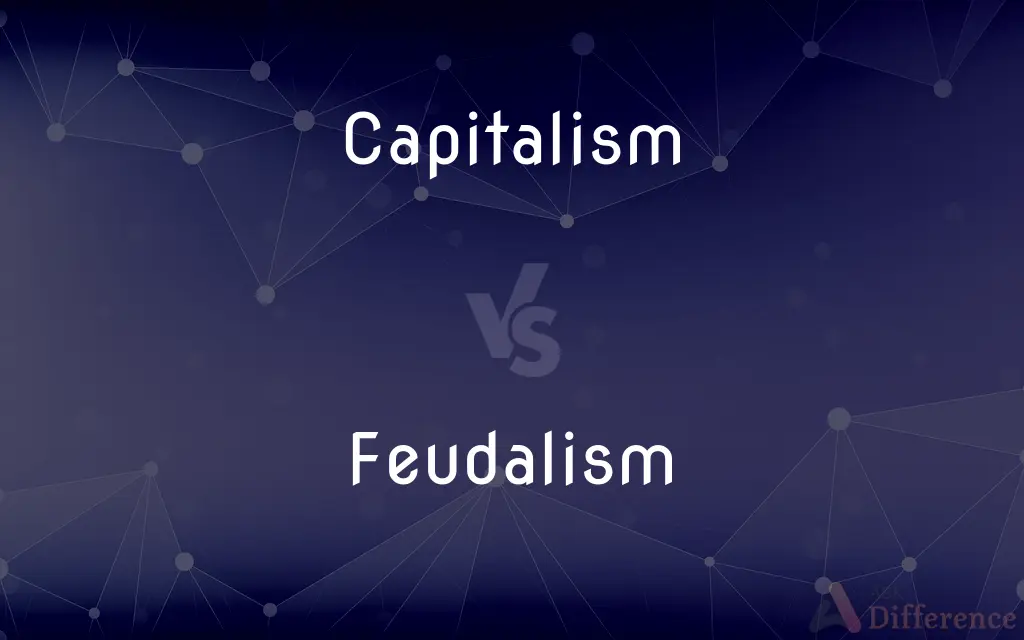Capitalism vs. Feudalism — What's the Difference?
By Tayyaba Rehman — Updated on October 28, 2023
Capitalism emphasizes private ownership and profit motive, while Feudalism centers on land ownership and hierarchical obligations.

Difference Between Capitalism and Feudalism
Table of Contents
ADVERTISEMENT
Key Differences
Capitalism is an economic system where private individuals or corporations own and operate the means of production. Feudalism, on the other hand, is a social, economic, and political system in which land was owned by lords who rented it to vassals in exchange for loyalty and service.
Under Capitalism, the drive for individual profit is paramount, and market forces of supply and demand determine prices and wages. In contrast, Feudalism has a rigid class structure, where the nobility owned land and serfs or peasants worked it, giving a portion of their produce to their lords.
Capitalism is associated with economic freedom, competition, and the role of a consumer-driven marketplace. Feudalism is characterized by its lack of economic mobility, with peasants tied to land and lords holding significant power over their vassals.
In Capitalism, success and accumulation of wealth depend largely on entrepreneurship and innovation. Feudalism sees wealth and power primarily derived from land ownership and the labor of those bound to that land.
Capitalism often leads to industrialization and a focus on the individual's rights and freedoms. Feudalism, conversely, is centered on agrarian economies and emphasizes mutual obligations between lords and vassals.
ADVERTISEMENT
Comparison Chart
Ownership
Private ownership of means of production
Land owned by lords
Economic Drivers
Profit and market forces
Land productivity & obligations
Class Mobility
Economic mobility possible
Limited mobility; tied to land
Wealth Source
Entrepreneurship & innovation
Land ownership & peasant labor
Economic Focus
Industrialization
Agrarian economy
Compare with Definitions
Capitalism
Capitalism encourages entrepreneurial endeavors.
Capitalism has birthed many successful startups and tech giants.
Feudalism
Feudalism is characterized by a strict hierarchy of obligations.
In Feudalism, vassals owed military service to their lords.
Capitalism
Capitalism is an economic system based on private ownership.
The U.S. is often cited as a leading example of Capitalism.
Feudalism
Feudalism emphasizes mutual duties between lords and vassals.
The reciprocal nature of Feudalism ensured both parties met their obligations.
Capitalism
In Capitalism, market forces dictate production and pricing.
Capitalism relies on supply and demand to set prices.
Feudalism
Feudalism ties peasants to the land they work.
Feudalism restricted the mobility of peasants, binding them to their lord's estate.
Capitalism
Capitalism values economic freedom and consumer choice.
Thanks to Capitalism, consumers have a vast array of products to choose from.
Feudalism
Feudalism is primarily an agrarian economic system.
Feudalism thrived in medieval Europe before the rise of cities and trade.
Capitalism
Capitalism prioritizes profit through market competition.
Under Capitalism, businesses compete fiercely to gain consumer favor.
Feudalism
Feudalism is a system where land is owned by lords and worked by vassals.
Under Feudalism, serfs worked the land in exchange for protection.
Capitalism
Capitalism is an economic system based on the private ownership of the means of production and their operation for profit. Central characteristics of capitalism include capital accumulation, competitive markets, a price system, private property and the recognition of property rights, voluntary exchange and wage labor.
Feudalism
Feudalism, also known as the feudal system, was the combination of the legal, economic, military, and cultural customs that flourished in Medieval Europe between the 9th and 15th centuries. Broadly defined, it was a way of structuring society around relationships that were derived from the holding of land in exchange for service or labor.
Capitalism
An economic system in which the means of production and distribution are privately or corporately owned and development occurs through the accumulation and reinvestment of profits gained in a free market.
Feudalism
A political and economic system of Europe from the 9th to about the 15th century, based on the holding of all land in fief or fee and the resulting relation of lord to vassal and characterized by homage, legal and military service of tenants, and forfeiture.
Capitalism
(politics) A socio-economic system based on private ownership of resources or capital.
Feudalism
A political, economic, or social order resembling this medieval system.
Capitalism
(economics) An economic system based on private ownership of the means of production and their operation for profit.
Feudalism
A social system based on personal ownership of resources and personal fealty between a suzerain (lord) and a vassal (subject). Defining characteristics are direct ownership of resources, personal loyalty, and a hierarchical social structure reinforced by religion.
Capitalism
A socio-economic system based on private property rights, including the private ownership of resources or capital, with economic decisions made largely through the operation of a market unregulated by the state.
Feudalism
The feudal system; a system by which the holding of estates in land is made dependent upon an obligation to render military service to the king or feudal superior; feudal principles and usages.
Capitalism
An economic system based on the abstraction of resources into the form of privately owned capital, with economic decisions made largely through the operation of a market unregulated by the state.
Feudalism
The social system that developed in Europe in the 8th C; vassals were protected by lords who they had to serve in war
Capitalism
An economic system based on predominantly private (individual or corporate) investment in and ownership of the means of production, distribution, and exchange of goods and wealth; contrasted with socialism or especially communism, in which the state has the predominant role in the economy.
Capitalism
An economic system based on private ownership of capital
Common Curiosities
What's the main principle of Capitalism?
Private ownership and profit-driven enterprises.
How did Feudalism function in terms of land ownership?
Lords owned land and leased it to vassals in exchange for services.
Is innovation a key feature of Capitalism?
Yes, competition in Capitalism drives innovation.
Can you have Feudalism in modern society?
While the pure form of Feudalism is rare, some elements like land-based power dynamics exist in parts of the world.
Is entrepreneurship encouraged in Feudalism?
Not in the way we understand it; Feudalism had a rigid structure with roles defined by birth and duty.
Were serfs in Feudalism considered free?
No, serfs were bound to the land and their lords.
Can socialism be mixed with Capitalism?
Yes, many modern economies mix elements of socialism and Capitalism.
Is the U.S. a purely Capitalist economy?
No, the U.S. has a mixed economy with both Capitalist and regulatory elements.
How do businesses operate under Capitalism?
They operate to maximize profit in a competitive market.
Did Feudalism have a monetary economy?
Not predominantly; it was more of a barter and service-based system.
How did lords in Feudalism acquire their lands?
Often through inheritance, conquest, or royal grants.
Is Capitalism inherently democratic?
Not necessarily, but it often coexists with democratic systems.
Was there any social mobility in Feudalism?
Very limited, as one's status was largely determined by birth.
How do Capitalism and Feudalism differ in wealth distribution?
Capitalism bases wealth on market success, while Feudalism's wealth is land-centered.
What causes the transition from Feudalism to Capitalism?
Factors like urbanization, trade expansion, and industrialization played a role.
Share Your Discovery

Previous Comparison
Values vs. Moral
Next Comparison
Dog vs. DoggyAuthor Spotlight
Written by
Tayyaba RehmanTayyaba Rehman is a distinguished writer, currently serving as a primary contributor to askdifference.com. As a researcher in semantics and etymology, Tayyaba's passion for the complexity of languages and their distinctions has found a perfect home on the platform. Tayyaba delves into the intricacies of language, distinguishing between commonly confused words and phrases, thereby providing clarity for readers worldwide.
















































